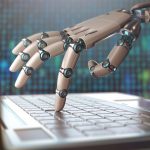What is a robot? This is not a philosophical question, but a practical one. Honestly consider, what defines whether something is a robot or not? Would a human-like form, that does a human’s job, round the clock, without the normal needs for rest and sustenance qualify as a robot? In that case, robots are not new to the 21st century. In fact, they are actually as old as anyone can remember, because as long as farming has existed, scarecrows (or something similar) have been used. Often, when we examine technology closely, especially the future of robots, what we find might not be as impressive as we hoped for. But what it stands for, is much bigger.
This is the case with the new Robocop that the Dubai police force recently unveiled. The machine roughly has the outline of a human, but its eyes are cameras and its feet are wheels. What makes this robot tick is the tablet in his chest, acting like a robotic heart. It’s able to shake hands and salute attentively, oohing and aahing fans at a press conference. “These kinds of robots can work 24/7. They won’t ask you for leave, sick leave or maternity leave. It can work around the clock,” one officer commented. And yet, all the glitz and the glamor of a Robocop disappears away when you realize that it’s a scarecrow on a Segway with a tablet. It can’t do much more than smile for pictures, shake hands, and give directions to tourists.
Humanity dreams about the future – what it would be like with unlimited technological advances. Hollywood hasn’t helped, and it’s natural for public sentiment to want to be a part of these technological shifts. And when we watch videos of Robocops in Dubai, it feels like we’re a part of history, watching it turn a new chapter before our very eyes. It’s a symbol of power, strength, brilliance, and cutting edge technology. It’s shiny and impressive – all the things that go great on the cover of a newspaper (or blog article).
However, while this particular robot doesn’t boast great things, what it stands for, does. Dubai’s Robocop shows an initiative at being a more technologically advanced culture. From artificial intelligence, to driverless cars and drones, The United Arab Emirates are pursuing an advanced society unlike any other.
Real robots certainly are out there, however. And they certainly will take some jobs away from hard working people. But new jobs will be created, and the workforce will balance out. Where this balance falls will be decided by governments around the world. The real robots of today are much less attractive, but much more effective. They’re machines tucked away in warehouses, doing the work of a hundred workers.
Much more important than the “what?” when discussing the future of robots is the “who?”. Who will be controlling them? Who will program them? And what are they designing them for? It’s time to face the reality that robots will be used for more than your living room vacuuming, and the future of robots will certainly be as political as it is technological.










